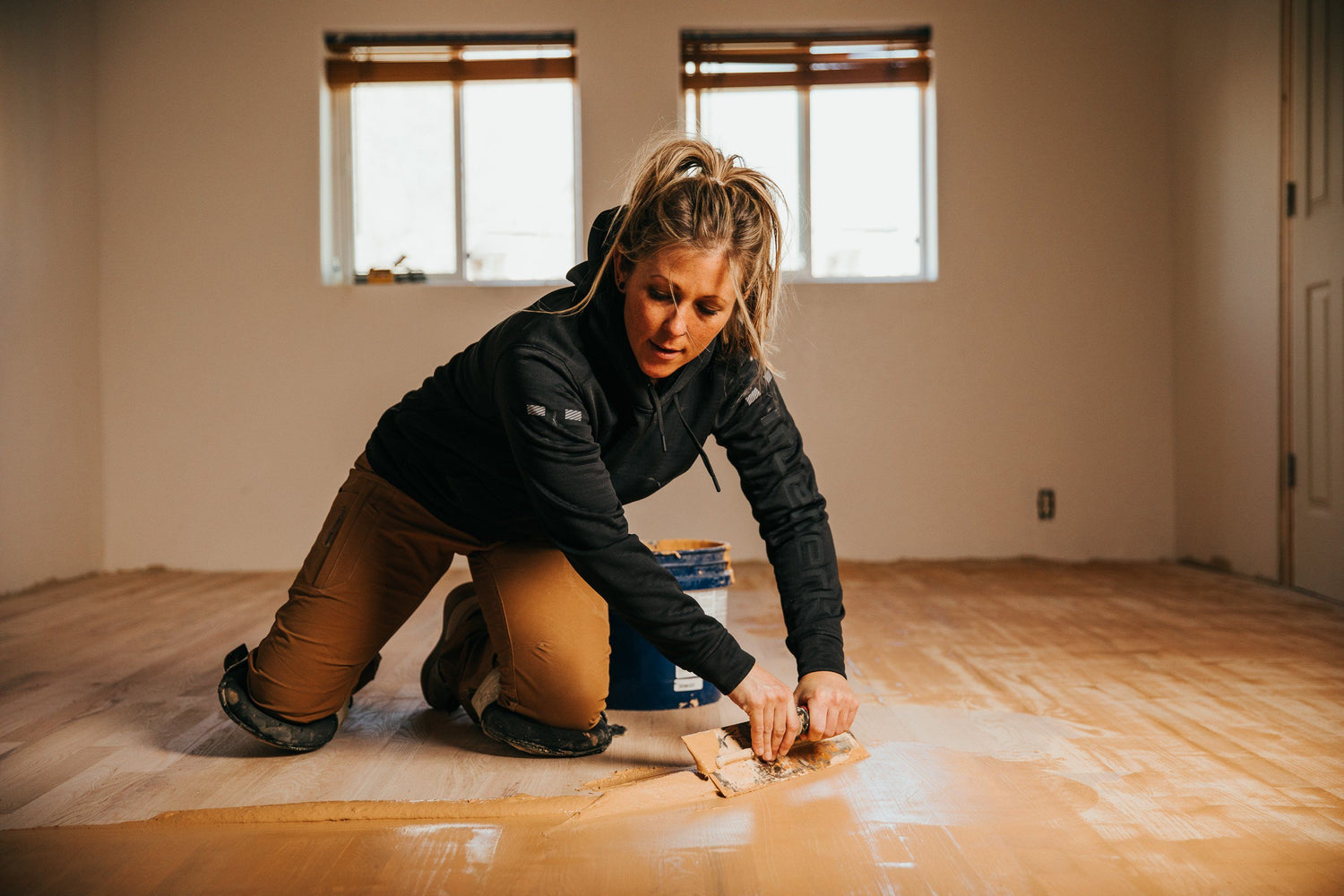Laurie Bitzkowski is an artist. The hum of tools fills the room, music flows loudly from a boombox speaker and the satisfying smell of freshly-sanded wood lingers as she creates another masterpiece. Bitzkowski’s canvas is the floor. Her medium is a variety of hardwoods.
Our Truewerk photographer is capturing footage of Bitzkowksi in her element for our women’s fit. I’m on my way out after interviewing her when I’m captured by the scene of it all.
Society tells us at a young age, “find what you’re passionate about and pursue it” and then when the decisions that guide careers creep up, we’re fed the contradicting message that “you can’t make a living off a passion.”

Yet as I watched, it became undeniable that Bitzkowski clearly found a way and to say she’s just making a living doesn’t do it justice. She’s building a life of quality. She’s owning and managing her own business. She’s rewarded daily by her passion. All because she chose to Trade Up.
If you’ve been around Truewerk for a bit, you’ll notice we’ve been talking about trading up. But what does Trade Up really mean?
To us, it represents the decision to take your creativity, passion and intelligence into the skilled trades.
Our brand exists for those that have chosen and those who may still choose to Trade Up. So, when we thought about how to acknowledge Small Business Week this year, it became clear that starting the conversation about Trading Up took precedence over providing resources, tactics and tips for running a business.
Why is no one talking about the fact that 20% of all self-employed professionals work in the skilled trade industry? Why do articles about the “Best Businesses to Start” or the buzz of support on social media for small business this month seem to skip over the community of people that Trade Up everyday?
With the industry facing an increased shortage of talented professionals, it’s crucial for those already Trading Up to help us usher in the next generation of those who will do the same. It feels like a responsibility we can’t ignore to highlight inspirations like Bitzkowksi, to share their journeys so we can learn from them and acknowledge that choosing to Trade Up is a choice you should feel proud to have made.
EVOLVE AND KEEP EVOLVING
One of the things we love most about the trades is that it’s ever-evolving: the work, the job sites, the clients. You may start with one material, trade or career path, but then end up progressing into something entirely different.
Bitzkowski’s entire business was born from her ability to see things a little differently and evolve accordingly. She always pictured her future being in art, but how she pictured it required a college degree. What began as a side-gig to earn some extra cash to pay for her tuition ultimately ended up shifting her entire perspective on that art future she was pursuing.
“I was thinking I wanted to be an art professor someday. I started doing sanding and I really, really enjoyed it. It was so much fun. You have to have a certain eye to see how it looks, it’s an art in itself. I found a different way to make art my career,” Bitzowksi said.
She saw art, where others saw only work. Her eye evolved.
Ken Ballin, owner of Skyro Floors, evolved into a skilled trades professional with his own business by keeping his eyes and ears open to new possibilities too.
“I was working in retail. I started out in clothing when I was a teenager, and worked at a big box install retail store after college in my twenties and then evolved into being a contractor,” said Ballin.
One of his first big clients was that same big box store he used to work for which helped jumpstart his business. Serendipitous? Only on the surface (no pun intended). He fostered connections, kept in touch and used his retail skills to build relationships.
After doing repairs and renovations on his own home, he realized he was serious about Trading Up and leveraged those connections to create opportunities for himself. We’ve seen it time and time again: One gig can lead to a lifetime of gigs and ultimately, a career.
It’s not just in the gigs though. Ballin and Bitzkowski didn’t get where they are by pivoting their life direction and endlessly laboring. They had to put themselves out there. They had to be willing to learn from others, ask questions, discover how to create a lasting impression. They had to figure out how to become the type of professional that clients and colleagues recommend and remember.
Like entrepreneurs in tech and business, it takes courage and dedication to start something on your own. Time, too. It’s not a linear journey and definitely not an easy one.
FACE THE SELF-DOUBT
Bitzowski’s dad is a carpenter and she recalls going with him to his jobs, seeing him pointing out little things about the cabinets and feeling enamored with it all, thinking they were perfect. So, perhaps the joy of working with her hands is in her blood and pursuing a career in the skilled trades was only natural. But the bravery to start her own company wasn’t as natural.
She opened her own business only a year after working side-gigs. She was borrowing sanders all the time for jobs, but they kept breaking because she wasn’t the only one using them. Her commitment to quality of outcome for jobs meant that she started buying her own tools. Eventually, it came to the point where she had everything she needed: compressors, sanders, buffers, vacuums -- all of it. She had no reason not to start her own business.
Despite her certainty on the reasoning, self-doubt found a way to sneak in. Ballin also confessed, self-doubt is still his biggest challenge.
“There's always that element of do I belong here? Am I doing this for the right reasons? Am I good enough to do this? So, I was really doubting myself. I had a lot of doubts. Should I go find a nine to five, do something else? I have a degree, maybe I should look for something that uses the degree and I could actually use my education,” Ballin said.
We’ve all been there. We question our decisions. We experience feelings of anxiety. We overanalyze our performance. We simply feel like we’re not good enough.
No one, not even the world’s brightest 363 self-made billionaires, is exempt from these emotions.
It’s part of the reason we know the trade industry deserves to be recognized alongside all the other self-made success stories out there. No matter what field you’re in, being an entrepreneur or business owner comes with the same set of feelings to overcome and the same decision to not give up, despite those feelings.
Why does society seem to value entrepreneurial traits in one group and not in another? In our eyes, the value of a trade professional’s experience is as equally important as that of a startup tech CEO.
The tech world has adopted this mantra of “fail fast.” It means don’t wait too long before you take a leap into something new because that failure can be a powerful moment in the journey to success.
Losing a big contract unexpectedly was a pivotal moment in Ballin’s career. It was the moment that pushed him to take the next step he needed to overcome his self-doubt. He was faced with the decision to have resilience or to recede. We don’t have to tell you what he chose.
He pushed himself to complete the Certified Tile Installer (CTI), joined an online community of other flooring pros and after passing his certification test, became an advocate for taking yourself further whenever you can. These steps helped him feel more confident in his decision.
A certain level of self-doubt can drive us, and too much self-doubt can put us in a standstill. Ballin let it drive him.
“I’m big on helping other contractors find that same path, get their certifications, get their training, help them out. I get messages and emails and calls and texts all day long, hours across the country with similar questions. And, it really just let me know that I was in the right place,” said Ballin.
There is so much knowledge and training available that anyone is capable of transforming their doubt into drive and taking it to the next level, whether that’s by owning a business or not. The beauty of the trade industry is that there isn’t a corporate ladder to climb or a big suit and tie telling you “you can’t.”
The only thing you can’t do is let yourself give up.
Bitzkowksi took her leap of faith when she abandoned her art degree and kept jumping when she started her own business. At Truewerk, we consider these continuous leaps of faith part of Trading Up.
“With starting your own business, you can’t give up. There are a lot of challenges that come up and times where you feel like, why am I doing this? It would be so much easier to just get a job at a restaurant or something. You go home at the end of the day and don’t think about it with a job like that. But you don’t give up because of those thoughts, it always does work out,” said Bitzkowski.
Bitzkowski’s business, Harmony Hardwoods, is named after being in harmony with things. She often feels running a business is like yin and yang. When you make a mistake, learn from it. When something goes wrong, figure out what went right.

You can’t dwell on decisions gone wrong, you have to just be thankful you made the decision when you did. We’re all humans that make mistakes, but it’s how we handle our failures that matters.
“Learn from your mistakes and just keep pushing forward. You have to have the ability to look at the business as a whole. Don’t base it on one job. It’s based on the months collectively,” said Bitzkowski.
In other words: Fail fast.
ACCEPT THE SACRIFICES, SET YOUR BOUNDARIES
First, it was getting the contracts. Then, overcoming self-doubt. Next, finding the crews. Now? The time.
“As I grew, I had to bring on more team members and stuff like that. At my height [with that contract], I want to say I had 13 stores and about a dozen crews working for me. And I just became the go-to guy. Any time something got messed up, they called me,” said Ballin.
Ballin stayed busy for six months nonstop without a day off and nearly 13 years after he initially started Skyro Floors, he tells us most of his time is still taken up by setting tile. Finding the balance between running his business and everything else is a daily battle.
“We don’t punch out like everybody else, we don’t punch a time clock. So just because I’m not ‘working’, doesn’t mean I’m not working. We’re not always doing business, but we’re always open. Just because I stopped setting tile doesn’t mean that the phone stops ringing and the paperwork doesn’t need to be done,” said Ballin.
It’s a battle all entrepreneurs fight and Bitzowkski was no exception.
“When I first started it was just, go, go, go, go, go. Busy, busy, busy. And I just wanted to appease everybody with their schedules because people want their floors done and they're living in chaos. And so, I had to sacrifice a lot of my time and I am a mom and have two kids. So it was tough in the beginning because I didn't know how to be strict with my schedule,” she shared. “There were times when I just didn’t know how to say no.”
With owning her own business, she’s realized it’s all about learning and not taking on everything. When you’re your own boss in the skilled trades, you’re doing more than just the labor: You have to be able to recognize which jobs are worth saying yes to and which jobs will be the ones that reward you personally and professionally.
Beyond finding the balance within the business, it’s vital to set boundaries that protect your personal life, too.
Both Bitzkowski and Ballin have kids. Success to them doesn’t mean choosing between quality time with the people you love or grinding at work. There’s always a way to find room for both.
Bitzkowksi might stack up jobs so she can take several weeks -- even months -- off and focus on her other priorities while Ballin recognizes he has the freedom to build his schedule exactly as he wishes.
“I might not want to be off during the weekend because that's when the most traffic is around. But you know what? I can take off on Tuesday and do something with my kids in the summer. And that's when nobody's around. But if I'm punching the clock, working a nine-to-five, I don't have that freedom,” said Ballin.
Owning your own business gives you the ability to tackle the balance in the way that’s best fit for your life.
Balance and commitment aren’t the only tricky things to face: Learning the ins and outs of how much supplies cost, knowing your worth when it comes to how much you should be compensated, deciding when you need to bring in other contractors or crews and even, figuring out your own insurance plan.
IT’S MORE THAN HARD WORK
“You have to know what it costs to open your eyes in the morning,” said Ballin.
He advises people interested in taking their career to the next level to go take a few business classes if they’re unsure how it all works, go through all the training and certifications relevant to your trade and keep asking yourself how you can become better.
“[Taking your career further] is so much more involved than just doing the work,” continued Ballin.
The next generation has the unique advantage of being tech-savvy and knowing what an advantage technology can be. Younger installers can come up into the trades, learning a lot more, a lot quicker with the internet at their disposal. The old timers might not like it because they feel they’ve paid their dues and the up and coming workers should too, but Ballin is on the opposite side of that.
“Nobody benefits from people failing. We rise by lifting others and your success can be based on what you put out into the universe,” explained Ballin. “I want everyone to have the information they need, whether it’s by asking or utilizing the stuff that’s out there already.”
The digital realm isn’t just about access to information either. It helps us connect with like-minded people and show not-so-like-minded people how interesting the trade industry really is.
When Ballin wakes up, he reminds himself of this. While he brews his coffee, he checks emails, social media and listens to some industry podcasts. He keeps himself looped in.
“I like to catch up on those because not only is it like-minded people, contractors in the industry, but it's also people you wouldn't expect. Kyle had a business coach on and Luke has different higher ups from some of the manufacturers come on. And it's nice to hear other like-minded people talking about the same thing,” Ballin said.
This type of content showcases that skilled trade professionals are much more than tool belts and labor. They’re thinkers and innovators. They inspire each other to constantly get better. It’s part of the reason we love being a part of this community so much.
In a society where everyone is trying to be the best, it’s refreshing that this community defines “being the best” a little differently.
We don’t want to see each other fail for our own gain, we want to challenge each other to keep bettering ourselves, keep pushing the limits and feel proud of what we do.
Freedom: In America, it’s a birth-given right, but if you layer in a 9-to-5 or maybe a bigwig boss or even just a client that knows exactly what they want, all that freedom starts chipping away unless...you Trade Up.
Sure, Bitzkowski and Ballin are still tied down sometimes by schedules or supplies, but establishing their own businesses has given them the freedom to pursue rewarding experiences, get creative with their work and learn new things. And isn’t that what we all hope for in our own way?
While some trade professionals find solace in the way wires work together to create a system or appreciate the routine of installing plumbing, others enjoy the sneaky perk of creative freedom.
Ballin, like Bitzkowksi, has always been into art, drawing, painting - the creative process - and he naturally worked himself into a niche where he has the freedom to channel those interests in the way the tiles are arranged or with a new mix of materials. His commitment to showcasing his work on social media has helped him not only inspire future trade pros, but also developed a reputation for his unique style.
He’s doing a bathroom remodel right now and the client trusted him, thanks to his portfolio, to have total creative freedom.
“[The client] said ‘Whatever you want to do, go for it,’ That happens a lot because of the reputation I’ve made for myself. I can take somebody’s selections and do what I want with them. I might do some scribing with mosaics or pebbles in a swirl pattern. There’s all sorts of variations,” said Ballin. “I didn’t always have that freedom, so now that I do, I really like to push my limits and have fun with it.”

Bitzkowksi has grown her business enough that when it comes to her choosing her own jobs, she cherry picks the ones that give her the opportunity to do the things she enjoys most, like staircases or smaller rooms.
Bitzkowski finds reward in her freedom to keep learning. When new hardwood might require unhooking gas lines, she hires crews to help her and learns the ins-and-outs of a different trade.
She teaches too.
“I would employ younger kids. They were maybe in their 20s and I taught them everything. It was really nice to see younger people who really enjoyed it. It was rewarding to see. And to be sanding is really rewarding to me, too,” said Bitzkowski.
What other people see only as hard work, she sees as fun. She’s even doing the flooring in her own home.
“It was my first day off in a while and my friend asked me what I did and I was like, ‘Oh I put the floor in and it wasn’t work.”
At Truewerk we talk a lot about the flow state and how when you get there the focus and enjoyment is basically a state of bliss. It’s more like play than work.
The most rewarding thing for Ballin is being able to do for others. He confessed the projects he enjoys the most are the ones he doesn’t get paid for. He wouldn’t be able to pursue those if he hadn’t bravely started Skyro Floors.
“We just had a project around here, it was a local family and one of the kids needed the bathroom redone, she's in a wheelchair. So I pulled together a group of local guys that I'm friends with and we renovated the bathroom, did all the floors in the house in eight days, and we got all the materials donated, all the labor was donated,” shared Ballin. “And being a business owner, I have the freedom to do stuff like that now. And it wasn't always that way. So I always talk about charging what you're worth and making sure that you're being paid what you need to. But the flip side of that is the freedom that it gives you to do for others.”
At the end of the day, it’s not about who’s path is “harder,” a difficulty-Olympics is a waste of everyone's time. It’s about ensuring that the next generation knows there’s another path to entrepreneurship beyond business degrees or coding camps.
Want to be your own boss, want to be THE boss? Trade Up.
Finally, to help celebrate trade professionals who take the path to entrepreneurship, Truewerk has partnered with Housecall Pro, a mobile app and web portal that helps pros efficiently manage every aspect of their business all in one place with easy-to-use digital tools for scheduling, dispatching jobs, managing payments, automating marketing efforts and more.
You may have already noticed based on our approach to workwear, but Truewerk is a big fan of any solution that empowers pros to work simpler and grow smarter -- and Housecall Pro does exactly that. They’re offering our customers 50% off their first 2 months when you sign up Housecall Pro sign up link here.












